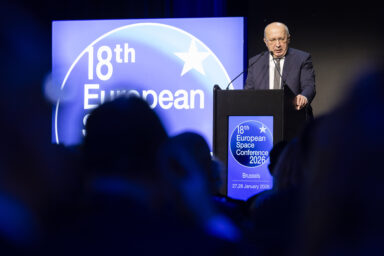The European Media Freedom Act (EMFA) takes full effect across the European Union on 8 August, setting out one of the bloc’s most ambitious efforts to safeguard media pluralism and independence. However, concerns linger over the preparedness of member states to implement the legislation effectively.
The European Media Freedom Act aims to strengthen press freedom and protect media independence. The Act sets out rules to shield journalists from political interference and spyware surveillance, guarantee stable funding for public service media, and increase transparency in media ownership and state advertising. It also tackles the growing power of large online platforms by limiting their ability to arbitrarily remove independent content, and giving users more control over the way they engage with media.
Media freedom is not negotiable. It is the backbone of our democracy — MEP Sabine Verheyen (EPP/DEU), Vice-President of the European Parliament
The European Commission has emphasised the significance of these measures. MEP Sabine Verheyen, Vice-President of the European Parliament, stated: “Media freedom is not negotiable – it is the backbone of our democracy.” Her fellow parliamentarian Nela Riehl (Greens-EFA/DEU), chair of the culture committee, added, “With the Media Freedom Act, Europe has set the benchmark for protecting press freedom and journalistic work.”
Member states’ political will
Ambitious as the EMFA goals are, implementation across the EU remains uneven. Pavol Szalai, head of the EU-Balkans desk at Reporters Without Borders (RSF), expresses concern about the lack of political will in most member states. “It’s been a year since its adoption, and member states have had time to prepare. But very few have started ambitious implementation.”
EU official echo the concern. Ms Riehl called the act “a great achievement,” but stressed it “is only meaningful if we adhere to it.” She voiced alarm over the ongoing decline in press freedom in parts of Europe and urged all member states to fulfil their commitments.
Mr Szalai points to Spain, France, and Germany as countries making some legislative progress inspired by the EMFA, though none have yet enacted full systemic reforms. In contrast, Hungary, Poland, and Slovakia show little political engagement, with Hungary standing out as the only member state to oppose the act outright.
You might be interested
“In Hungary, public media are state-controlled. They are party media, not public service,” Mr Szalai says. “They do not comply with Article 5 of the EMFA,” which requires editorial and functional independence of public service media. While Poland, he adds, has stopped using public broadcasters to spread hate, “but systemic reforms to ensure independence are still missing”.
Threat of surveillance, spyware use
Among the act’s crucial provisions is its stance on surveillance. Prompted by scandals involving the use of spyware in Hungary, Greece, France, and Italy, Article 4 of the EMFA sets limits on the deployment of spyware against journalists. It bars governments from using spyware unless strictly justified by national security or serious criminal investigations. Even then, it must be subject to independent judicial oversight. The law also protects journalists from sanctions or searches for refusing to reveal sources, unless a pressing public interest justifies it.
The biggest threat to press freedom in the EU is spyware. — Pavol Szalai, Head of the EU-Balkans Desk at Reporters Without Borders
But Mr Szalai warns that these provisions may not go far enough. “The biggest threat to press freedom in the EU is spyware,” he told EU Perspectives. “I think it’s a bigger threat than physical violence, because it’s more common.” Journalists are more likely to become targets of surveillance than assassinations, he says. Article is 4 a minimum standard, a mere compromise. “The problem is, in practice, ‘national security’ becomes a pretext for surveillance,” Mr Szalai concedes.
How will Brussels enforce?
While the EMFA is now fully in force, its success depends on the Commission’s willingness to enforce it. “Action, not words, will measure the true value of the law. Now the real work begins: ensuring every member state implements the EMFA fully and faithfully,” states Ms Verheyen, who chairs Parliament’s working group scrutinising the law’s implementation.
Now begins the real work: ensuring every member state implements the EMFA fully and faithfully — MEP Sabine Verheyen (EPP/DEU), Vice-President of the European Parliament
Mr Szalai agrees: “We need the Commission to be firm, give deadlines, issue requests, and move from carrots to sticks quickly if needed.”
In a press release, RSF urged the European Commission to consider infringement proceedings under Article 258 of the Treaty on the Functioning of the EU (TFEU) if implementation continues to stall. “This situation also constitutes a test of credibility” the organisation stated. The EMFA, they argue, must become the cornerstone of Commission President Ursula von der Leyen’s proposed “democratic shield”.
Economic and technological pressures
Beyond political interference and surveillance, media outlets across the EU are under mounting economic strain, much of it driven by the dominance of tech giants. Mr Szalai describes a system where political and economic pressures often overlap. “Media don’t just face competition within the sector,” he points out. “They’re hit by economic pressure that’s politically driven, such as strategic lawsuits designed to create economic pressure.”
Platforms must have the obligation to promote reliable media content. Only EU-wide regulation can rein in these global players. — Pavol Szalai, Head of the EU-Balkans Desk at Reporters Without Borders
The rise of digital platforms has further weakened the financial stability of traditional media, with social networks and search engines capturing the lion’s share of online ad revenue. “We need these algorithms to be transparent,” Mr Szalai says. “Platforms must have the obligation to promote reliable media content. Only EU-wide regulation can rein in these global players.”
To address these challenges, the EMFA introduces a structured dialogue mechanism under Article 18, which establishes regular consultations between Very Large Online Platforms (VLOPs), media service providers, and civil society representatives. The goal is to share experiences and best practices on how platforms manage independent media content, ensure users have access to a wide variety of trustworthy news sources, and monitor efforts to combat harmful content, such as disinformation and foreign interference.
Empowering journalism
For journalists themselves, the EMFA could become a powerful tool to assert editorial independence and protect their work from political or commercial pressure. “Every journalist can look at this legislation and think ‘how can I use this to protect my independence’?” says Mr Szalai. He calls it a historic opportunity. “This law has no equivalent in the world.”
With the EMFA now fully in force, the spotlight shifts from legislation to implementation. The coming months will test not only the political will of national governments but also the European Commission’s ability to enforce compliance and uphold the regulation’s spirit.











